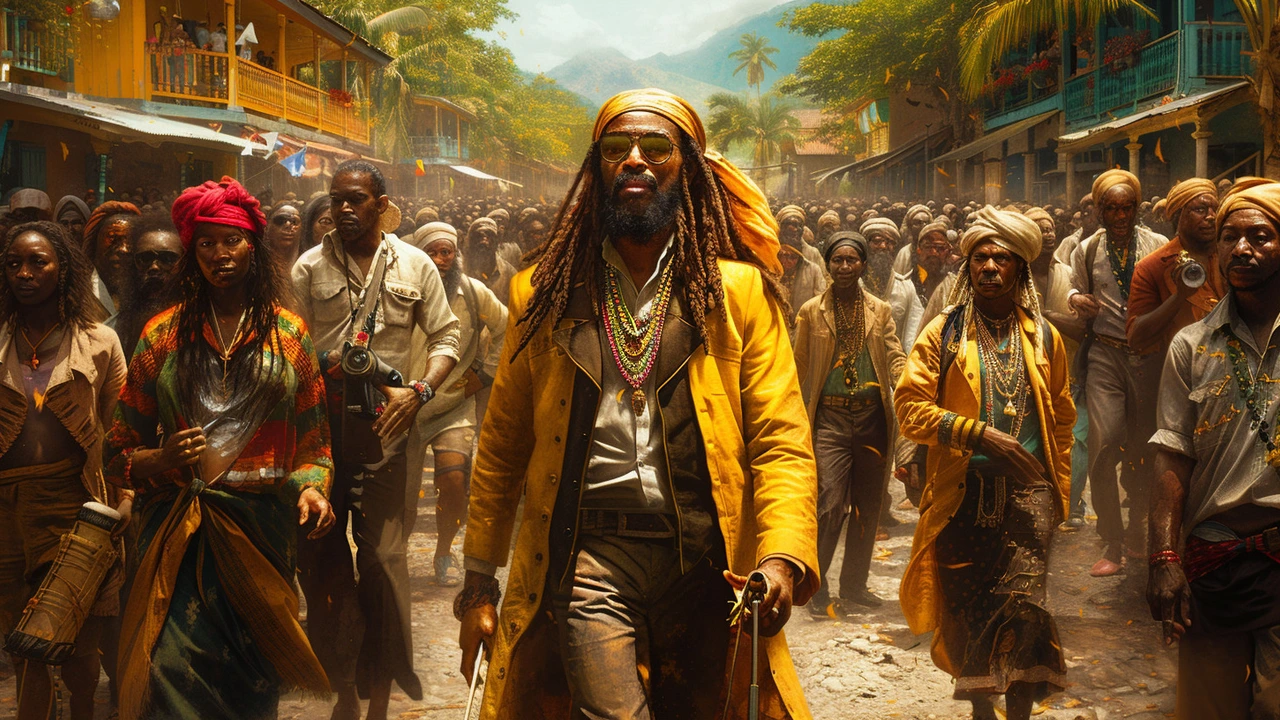The Roots of Reggae: A Journey to Jamaica
Imagine if you could smell colors. Imagine the scent of green mountains, golden sunsets, and turquoise seas. When you listen to reggae music, is this not what you breathe in? Although my name is Zephyr, an easterly wind, I've been led west. Carried on the rhythms of Bob Marley, Peter Tosh, and Burning Spear, my spirit found its way to Jamaica, the birthplace of reggae.
Let me tell you, those musicians put their heart into their music. Their emotions intertwining with their beats to produce a unique blend of melody, almost seeming like a personification of the island's vibrant culture. And, speaking of heart, did you know that the use of the offbeat in reggae often mimics the rhythm of the human heartbeat? A fascinating fact, wouldn’t you agree? This perfectly symbolizes the core essence of reggae - it is life embodied in music.
Reggae music isn't just a genre; it's a cultural reflection of Jamaica's rich history, expressing through its lyrics the struggles, hopes, joy, and resilience of its people. Its combined African and Caribbean influences have created a unique rhythmic language that communicates love, unity, and a desire for social justice. To truly understand reggae, you need to explore its roots, which reach deep into the Jamaican soul. When you trace those roots, you don’t just hear the music, you feel the heartbeat of Jamaica.
Reggae On Stage: Sharing the Spirit
A few years ago, my own heartbeat synced up with that of reggae during a concert on the beaches of Jamaica. I saw the reggae spirit in its purest form as the band, drenched in the golden Caribbean sun, filled the space with the sounds of life. They captured the crowd's pulse, their rhythm becoming our shared heartbeat. There was a certain unity, a beautiful harmony that only reggae can achieve. It was poetry, it was outcry, but above all, it was a celebration of life.
Each strike of the drum, every strum on the guitar, and the powerful vocals enveloped us, transcending barriers of language and culture. The energy was infectious, with no one able to resist the inviting pull of the rhythm, and soon, everyone was up and dancing. It was a magical moment where everyone, despite their diverse backgrounds, came together, united by the commanding sound of reggae.
I'll never forget when the lead singer, mid-song, pointed at me and brought me on stage. I was terrified at first, but then I was hit with an all-encompassing sense of belonging. I could see the sea of swaying bodies, feel the rhythm from the drums, but most importantly, I could feel the unifying power of reggae intimately.
Rastafari Impact on Reggae
Reggae music also carries deep spiritual undertones, rooted primarily in the Rastafarian faith. Rastafari, far more than a religion, is an Afrocentric sociopolitical movement that began in Jamaica in the 1930s. It emphasizes unity, resistance to oppression, and the pursuit of freedom, principles that strongly resonate in the lyrics and rhythms of reggae. Bob Marley, perhaps the most iconic reggae musician, was a committed Rastafarian and his music encompasses the teachings, the perspective, the essence of Rastafari.
One magical experience I had during my travels in Jamaica was visiting the Bob Marley Museum in Kingston. Walking through the rooms he had once occupied, I felt an overwhelming connection to the man, the music, and the movement. The air was rich with shared stories, passion, and purpose. It was potent and stirring, a reminder of the power of reggae music to champion social justice and foster interconnectedness.
Cultural Evolution of Reggae: A Tipping Point of Transformation
Reggae itself went through a beautiful metamorphosis over the years, moving beyond the borders of Jamaica to spread worldwide. Its nuances were embraced by countless cultures that added their flavor to it, creating diverse offshoots such as Reggaeton, Dancehall, Ska, and Rocksteady. Each of these sub-genres retains the essence of reggae but presents it in a fresh, individual style, demonstrating the universal appeal and adaptability of reggae music.
Reggae's journey, from the heart of Jamaica to the global stage, is a testament to its profound resonance with audiences. It's more than a music genre; it's a language spoken in rhythm and melody. So, as I close this reminiscence of reggae, I invite you to listen to it with your heart, to dance to it with your soul, and to embrace it with your spirit. Let it become a part of your life as it has become a part of mine. As Bunny Wailer of The Wailers said, “Reggae is something that can’t be withheld. It’s got to be let loose.” So, let it loose.
The Thriving Legacy of Reggae: Beyond Beating Drums
In conclusion, remember, Reggae is a celebration. A celebration of life, resistance, unity, and above all, the celebration of the indomitable spirit of humanity. Take it from me, Zephyr, I've been to the golden beaches of Jamaica, I've danced to the pulsating rhythm of the reggae drums, I've been on a stage surrounded by people just brimming with the spirit of oneness.
And so, dear readers, I invite you. Connect with the rhythm, hear the persistent beat of unity in each bob-and-weave of your body as you dance to the songs, taste the tangy zest of life in the heart of each lyric. Let your heart beat to the rhythm of reggae, because the heart of reggae is indeed, the very celebration of life and unity.

